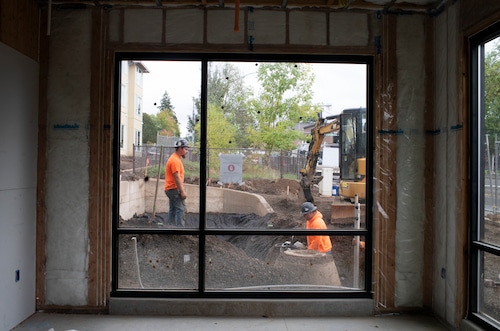The Portland-area’s three top county leaders have come out swinging against a proposal floated by the Metro regional government to redirect a massive surge in unanticipated funds from the region’s homeless services tax to construct more affordable housing.
Multnomah County Chair Jessica Vega Pederson, Washington County Chair Kathryn Harrington and Clackamas County Chair Tootie Smith warned in a letter this week that any effort to divert some of the nearly $1 billion in surplus revenue the tax is now forecast to generate over the next five years would imperil their counties’ work to tame the crisis on the streets.
The trio also pushed back on reports that their governments have failed to spend the hundreds of millions of dollars annually they currently collect through the tax to fund supportive housing, eviction prevention and mental health and addiction treatment.
“There is a myth that the counties collectively are sitting on significant amounts of unallocated funding, but that’s not true,” the letter says. “This year, the counties are making progress in achieving their Metro-approved spending targets.”
Budget documents show that Multnomah and Clackamas counties had only spent 25% of their yearly funding — $190 million and $93 million, respectively — when this fiscal year reached its halfway point in January. Washington County had socked $31 million of its roughly $120 million available for the year into reserves, those records show.
Multnomah County budgeted to spend $46 million of its of homelessness tax proceeds on outreach and emergency shelter during the fiscal year that ends in June, budget documents say. As of Jan. 1, it had spent just 9% of that amount, with nearly $42 million yet to spend.
In Clackamas County, officials budgeted $11 million from the tax to provide wrap-around services that qualify subsidized apartments as “supportive housing.” But by Jan. 1, they’d spent just 20% of that, leaving $9 million yet to spend, Metro records show.
Despite the underspending, the county chairs contend that their governments have thus far managed to dramatically expand outreach services, add shelter capacity and help thousands of people move into housing while preventing thousands more from losing it.
“We see early evidence that these efforts are working, and we cannot take our focus off of further advancing our regional goals or we stand to lose the hard-earned ground we’ve gained,” they wrote to a Metro regional housing advisory group, according to a copy obtained by The Oregonian/OregonLive.
“To put it simply, the cost to sustain current investments in ongoing services and capacity in each county will consume all available (Supportive Housing Services) forecasted revenue.”
In May 2020, voters approved the 10-year Supportive Housing Services measure, which generates money from a tax on high-income earners and big businesses in Multnomah, Washington and Clackamas counties. Counties began receiving money from the tax in July 2021.
Metro initially estimated the tax would raise $250 million annually. Recent forecasts project revenues to be substantially higher.
The regional government now expects the tax to bring in $357 million this year, up from an initial estimate of $234 million. The projections for future years have increased as well and could balloon to $437 million for the fiscal year that ends in June 2029.
Metro Chief Operating Officer Marissa Madrigal and housing officials for the regional government have proposed using some of that extra cash for home construction, specifically to build more affordable housing for low- and moderate-income households and workforce housing.
Voters approved a Metro housing bond in 2018 to fund affordable housing but all that money will soon be allocated.
Metro officials say that more money is needed for the region to reach its building goals. They are now weighing whether to ask voters in November to rejigger the homeless services tax measure to allow some of that revenue to fund new housing construction.
Vega Pederson, Harrington and Smith, however, say their counties will be unable to meaningfully address the region’s homelessness crisis with only $250 million a year.
“What we have learned since (2020) is that the cost of achieving our housing goals — while also maintaining our expansion in front-line services like shelter and outreach — will far exceed those original estimates,” they wrote.
Politics Editor Betsy Hammond contributed to this report.
-- Shane Dixon Kavanaugh covers Portland city government and politics, with a focus on accountability and watchdog reporting.
Reach him at 503-294-7632
Email at skavanaugh@oregonian.com
Follow on Twitter @shanedkavanaugh
Our journalism needs your support. Please become a subscriber today at OregonLive.com/subscribe.

Stories by Shane Dixon Kavanaugh
- Former head of Portland police union returns to city as chief’s top aide
- The Oregon police chief fired by two small towns: Beat Check podcast
- Will exodus of top Tina Kotek aides derail her success? Here’s what Oregon political insiders say
- Gov. Tina Kotek’s wife says she is in recovery from alcoholism, lives with mental illness
- Multnomah County chair has unparalleled power to block proposals she doesn’t like

